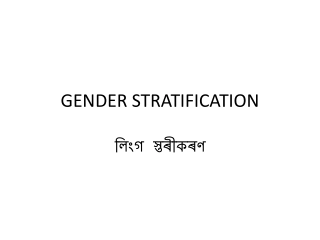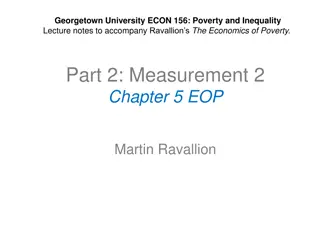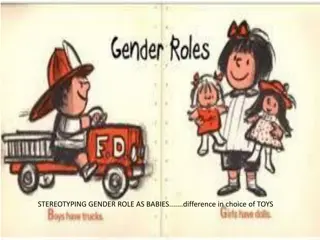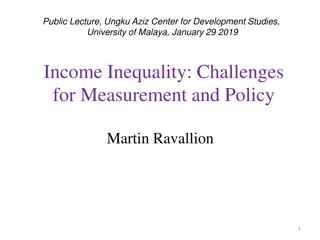Gender Inequality in Greek Media: An Analysis by Helena Gritzelaki
Despite advancements, gender inequality persists in Greek media across journalism, advertising, film, and television. The portrayal and representation of women remain stereotypical and limited. Efforts towards gender equality face challenges, including biases in important positions, perpetuation of harmful stereotypes, and mismanagement of movements like #MeToo.
Download Presentation

Please find below an Image/Link to download the presentation.
The content on the website is provided AS IS for your information and personal use only. It may not be sold, licensed, or shared on other websites without obtaining consent from the author. Download presentation by click this link. If you encounter any issues during the download, it is possible that the publisher has removed the file from their server.
E N D
Presentation Transcript
An analysis of Gender Inequality in Greek Media by Helena Gritzelaki
A Brief Introduction Despite the movement about women in media going back to the 1970s, 21st century Greece is still dealing with multiple inequalities between men and women in media, be it journalism, advertisement, social networks and film. These problems range from decade-long stereotypes to injustice in the workplace. What is the Greek government doing to establish gender equality in media? 2
Despite the majority of journalism graduates being women, less than 50% of them maintain important positions in news broadcasts. source: https://www.europarl.europa.eu/news/el/headlines/priorities/pagkosmia-imera-tis-gunaikas-2018/20180301STO98925/gunaikes-kai-mme-aparaititi-i-enischusi-tis-isotitas-ton-fulon 3
Stereotypes in Advertising Stereotypes in Advertising The Greek advertising community, consisting primarily of men, promotes unhealthy and outdated stereotypes about women. The Greek woman is portrayed as a superficial housewife that lacks critical thinking. The objectification of women is another common trope of Greek advertisements. Using the female body to promote products contributes to the oversexualization of women, as well as the specific image to what women should look and dress like. source: https://www.mcaounilaw.gr/ /changemediaforher/243- - - - 4
Women in Film and Television Women in Film Women in Film Hollywood s recent attempts to promote gender equality in film are neither received well in Greece, nor imitated. The role of women on the big screen has not changed since the 50s; The stereotypes of women being materialistic, weak and inferior continue to be pushed, and any attempt to demolish this stereotype is met with angry reactions about forced representation . Even more worrying than film, where one could argue that it is merely a fictional role, the Even more worrying than film, where one could argue that it is merely a fictional role, the handling of real women s stories on the news is very alarming. handling of real women s stories on the news is very alarming. Women in Television Women in Television The image of women in television does not differ from the one in film. Reality television continues this narrative, and we rarely see women as talk show hosts, but as topic of discussion. News reports about a female celebrity or politicin s clothes, behaviour, personal life are always discussed among reporters, which we rarely see for men. sources:https://www.avgi.gr/koinonia/277771_emfyles-anisotites-kai-sexismos-sti- biomihania-ton-mme 5
The mismanagement of the #MeToo Movement in Media Four years after the #MeToo movement gave a platform to thousands of women in the United States, the athlete Sofia Mpekatorou was the first Greek woman to speak publicly about her sexual assault, and many women bravely followed after her. How was this received by the media? Some outlets (like Star Channel) supported the accused, and despite them being proven guilty afterwards, no apology was issued. By some, it is treated like a trend , and no move to promote the country s support lines for physical, emotional, or sexual assault was made. Fortunately, projects of the assaulters were quickly discontinued and removed from television, but the fight for victims voices to be heard has only just begun. source: https://www.kathimerini.gr/society/561255481/to-metoo-eftase-kai-stin-ellada/ 6
We shouldn t be telling the victim not to react, but the assaulter not to assault. 7
Being a Woman on Social Media Sexist comments What do What do women women deal with deal with online? online? Unrealistic beauty standards Object- ification 8
What is the Greek Government doing to prevent gender inequality in media? 9
Not enough. There are guides and laws about gender equality and the representation of women in media, but this is only the beginning. Regulations need to be reinforced more. However, the future looks bright. Gender equality in media might be achieved sooner than we realize it. 10
Credits This presentation wouldn t have been possible without the following resources. Presentation template by SlidesCarnival Illustrations by StorySet 11























